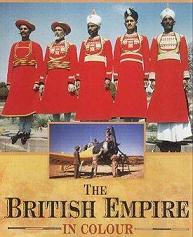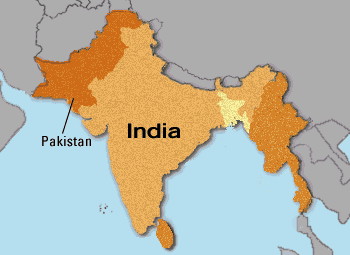|
Page < 1 2 3 4 5 6 7 8 9 10 11 12 13 14 15 16 17 18 19 20 21 22 23 24 >
Divide
and Quit
Alain
Danielou (1907-1994),
son of French aristocracy, author of numerous books on philosophy, religion,
history and arts of India, has said that the division of
India was on the human level as well as on the political one, a great
mistake.
It added, he says, to the Middle East an unstable state (Pakistan) and burdened
India which already had serious problems."
He further says:
"India whose ancient borders stretched until Afghanistan, lost with the
country of seven rivers (the Indus Valley), the historical center of her
civilization. At a time when the Muslim invaders seemed to have lost some of
their extremism and were ready to assimilate themselves to other populations of
India, the European (British) conquerors,
before returning home, surrendered once more to Muslim fanaticism the cradle of
Hindu civilization.
(source: Histoire
de l'Inde - Alain Danielou p. 355).
Horrors of Partition
"Partition
was a political maneuver in which the Muslim League and the British were
partners with the intention to Balkanize India and reduce it to a geographical
expression."
(source:
A critique of A G Noorani’s Kashmir Dispute 1947-2012 – By Mohan Krishen
Teng).
 Dramatic
new footage from India's partition in 1947 -- much of it in color (a three-part report by ITV
to be called The
British Empire in Color) and never been seen
publicly before -- will be shown on British TV this month. The
new footage gives the most vivid visuals yet of the violence and atrocities that
occurred during the partition when the sub-continent was broke up into Pakistan
and India. Dramatic
new footage from India's partition in 1947 -- much of it in color (a three-part report by ITV
to be called The
British Empire in Color) and never been seen
publicly before -- will be shown on British TV this month. The
new footage gives the most vivid visuals yet of the violence and atrocities that
occurred during the partition when the sub-continent was broke up into Pakistan
and India.
The
frames shot at the time of partition have stunned audiences at early screenings
and already provoked an argument among historians. The
partition is being compared with the ethnic cleansing
in Bosnia and Rwanda. "The British, and in particular Lord Louis
Mountbatten, Prince Charles's great uncle and adored mentor, come across as
vainglorious interlopers who left the continent when trouble loomed," The
Observer reports.
"Terrible
scenes, not seen before, of thousands of dispossessed refugees trailing across
the newly created border with Pakistan will make it hard to defend the memory of
colonial India as a caring, orderly place,
which was run in increasing collaboration with Indians."
Historian Andrew Roberts and Prof Judith Brown, the Oxford academic who
advised the program-makers on India, say these distressing
pictures will be a welcome jolt to Britain's
complacent self-image. "At the time of
transition the British establishment admitted that around 100,000 had
died," says Roberts. "But from my own researches the figure is more
like three quarters of a million. A figure not un-adjacent to what happened in
Rwanda and worse, I think, than in Bosnia.
"The
footage shows terrible trails of people and much of this is not known about in
Britain where it
was described at the time as 'a peaceful transfer of power.'"
(source:
British
TV to air horrors of India's partition - Times of India).
"...It
has rare images and comments that expose the British Raj as exploitative
and in many ways a shambles. The
documentary unravels much of the grim reality beneath
the grand spectacle of the Raj. The
pomp and show is also there to be seen, as never before. The spectacle of 20,000
men who came to honour Kind George V in Delhi in 1911. Lord Linlithgow is shown
as hunting down 38 rhinos, 120 tigers and 27 leopards over a three-month shoot
in the company of several Indian princes. The
film brings out the dire poverty in which most Indians lived, away from the
glamour in Delhi.
It quotes Gandhi as describing this as a "crime
against humanity".
The partition of India in 1947 was the most
tragic legacy of the empire, the documentary shows, giving horrific accounts of
atrocities. Of 10 million people who crossed over in Punjab, a million
died.
(source: Documentary
on British Empire stirs new controversy
- newindpress.com).
Sri
Aurobindo (1872-1950) most original
philosopher of modern India said, "India is free, but she has not achieved unity,
only a fissured and broken freedom."
"A fundamental
mistake”. That was how Maulana Abdul Kalam
Azad, the greatest of India’s Muslim leaders, described the
Partition of India on October 23, 1947. Many in both countries today agree that
Partition was a historical blunder.
(source:
Fundamental
mistake, historical blunder - By V. S. Dharma Kumar).
The country was partitioned on the basis of religion and undivided Bengal lost
its two-third area to Pakistan in 1947.
Partition triggered one of the
most terrible and bloodied exodus in the history of humanity. Partition, which the British
willfully and consciously left behind as a parting gift. Winston
Churchill's (who had called Gandhi a naked fakir), words on learning
about the chaos following Partition: "At last we had the last
word."
(source: Arise O India - By
Francois Gautier p. 85-92).
Prince
Charles much-publicized
British Golden Jubilee Banquet held in London, recently thanked
India for "its civilizing influence over
Britain", then proposed a toast for "real
India, the enduring and everlasting India", an India that had preserved its
identity through its experience of colonization.....What a volte face
for a nation that systematically during its 300 years of rule, denigrated every
aspect of the 'native' culture, including its philosophy and spirituality, and
supplanted it with its own imperial values, attitude and approaches.
(source:
The
empire strikes back
-
By Suma
Varghese
Publication: The Free
Press Journal Date: December 5, 1997).
 
In conclusion, it can be said that, from 1600, when the East India Company received its charter from Queen
Elizabeth, to 1947, when Lord Mountbatten packed up the Union Jack, the
history of the British in India has been one of treachery, exploitation and
untold savagery.
      
Page < 1 2 3 4 5 6 7 8 9 10 11 12 13 14 15 16 17 18 19 20 21 22 23 24 >
|